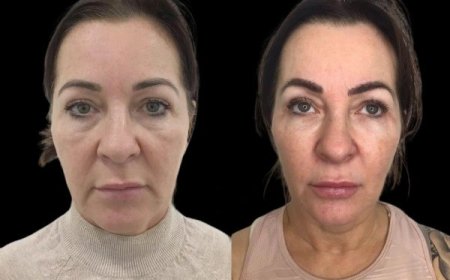Mental Health Clinic Support During Life Transitions
In this article, we’ll explore the types of life transitions that can impact mental health, how a mental health clinic supports you through these phases, and why seeking help during major changes is a sign of strength and resilience.

Life is full of transitionssome planned, others unexpected. While change is a natural part of growth, it often brings emotional stress, uncertainty, and mental health challenges. Whether you're navigating a new job, moving to a different city, experiencing parenthood, or grieving a loss, a trusted mental health clinic can provide the support and tools needed to manage these changes with confidence and emotional balance.
In this article, well explore the types of life transitions that can impact mental health, how a mental health clinic supports you through these phases, and why seeking help during major changes is a sign of strength and resilience.
What Are Life Transitions?
Life transitions are significant changes in circumstances, identity, or environment that shift the rhythm of your daily life. These can be:
? Positive Transitions
-
Starting a new job or business
-
Getting married or starting a family
-
Going off to college or university
-
Retirement
-
Moving to a new city or country
? Challenging Transitions
-
Divorce or breakup
-
Death of a loved one
-
Job loss or career uncertainty
-
Chronic illness diagnosis
-
Empty nest or caregiving changes
-
Aging and related lifestyle adjustments
Even positive changes can feel overwhelming. A mental health clinic offers tools to process the emotions that come with changeexcitement, grief, fear, guilt, or uncertainty.
Why Transitions Affect Mental Health
Life transitions often bring a loss of stability or familiarity. They may:
-
Challenge your identity or purpose
-
Disrupt routines and social support
-
Trigger old traumas or fears
-
Require major emotional or financial adjustments
-
Cause uncertainty about the future
For many, these periods become fertile ground for anxiety, depression, burnout, or even physical symptoms like insomnia and fatigue.
Getting support from a mental health clinic during these times helps you stay grounded, emotionally resilient, and forward-focused.
How a Mental Health Clinic Supports You Through Life Changes
? Emotional Validation and Safe Space
Clinics offer a confidential, judgment-free environment to talk about your fears, stress, or grief. Sometimes, simply being heard is the first step toward healing.
? Personalized Therapy
Clinicians use evidence-based approaches like Cognitive Behavioral Therapy (CBT), mindfulness, and solution-focused therapy to help you:
-
Process your emotions
-
Reframe negative thinking
-
Set realistic expectations
-
Build resilience and confidence
Therapists can tailor sessions specifically to the kind of transition youre facing.
? Goal Setting and Decision-Making Support
Life transitions often involve big choices. Your therapist can help clarify your goals, weigh pros and cons, and create a plan that aligns with your values and well-being.
? Coping Skills and Stress Reduction
Youll learn techniques like deep breathing, grounding, time management, and emotional regulation to handle the physical and psychological stress that transitions bring.
Common Life Transitions Mental Health Clinics Help With
? Starting College or Leaving Home
This transition involves independence, identity shifts, and academic pressure. Clinics support young adults with:
-
Managing homesickness or loneliness
-
Building social and emotional resilience
-
Navigating academic stress and anxiety
? Marriage or Parenthood
These joyous transitions come with major lifestyle adjustments. Clinics provide support for:
-
Balancing personal identity with new roles
-
Managing relationship stress
-
Preparing emotionally for parenting
-
Navigating postpartum depression or anxiety
? Divorce or Breakup
The end of a relationship is one of the most emotionally intense transitions. Mental health clinics help clients:
-
Cope with grief and loss
-
Rebuild self-worth
-
Learn co-parenting skills
-
Process anger, guilt, or fear of future relationships
?? Grief and Loss
Losing a loved one can deeply disrupt mental health. Therapists guide individuals through:
-
Mourning and emotional processing
-
Managing grief-related depression or anxiety
-
Finding meaning and closure
-
Rebuilding life after loss
? Retirement and Aging
The shift away from a career or changing physical health can challenge self-identity. Clinics support seniors with:
-
Combating isolation and loneliness
-
Exploring new purpose or hobbies
-
Managing cognitive and emotional shifts
-
Navigating health changes and dependency concerns
? Career Changes or Job Loss
Professional transitions impact finances, self-esteem, and stability. Mental health clinics help clients:
-
Manage stress, imposter syndrome, or burnout
-
Rebuild confidence and motivation
-
Cope with financial anxiety
-
Explore new career paths with clarity
Support for Children and Teens in Transition
Kids and adolescents face unique challenges with transitions like:
-
Changing schools
-
Moving to a new city
-
Parental divorce or remarriage
-
Puberty and social pressure
A family-friendly mental health clinic provides age-appropriate therapy to help children:
-
Express emotions through talk or play
-
Develop social and coping skills
-
Adjust to new environments or routines
-
Strengthen communication with parents
Involving the entire family often leads to more supportive home environments and faster adjustment.
Support for Caregivers and Sandwich Generation
Adults caring for both children and aging parents often experience chronic stress, called caregiver burnout. Clinics help with:
-
Setting boundaries and self-care routines
-
Managing guilt, resentment, or emotional exhaustion
-
Finding balance between roles
-
Accessing external support resources
Mental health care ensures caregivers stay emotionally strong while supporting others.
Group Therapy and Peer Support
Some clinics offer transition-specific group therapy sessions, which can be a powerful addition to individual therapy. Benefits include:
-
Shared stories that normalize your experience
-
Emotional validation from peers
-
Learning new coping strategies
-
Building community and reducing isolation
Whether you're grieving, starting over, or managing family transitions, group sessions offer strength in connection.
How to Know Its Time to Seek Help
If youre in the middle of a life change and experiencing any of the following, consider visiting a mental health clinic:
-
Persistent sadness or anxiety
-
Feeling overwhelmed or stuck
-
Difficulty sleeping or eating
-
Withdrawing from loved ones
-
Trouble making decisions or focusing
-
Loss of identity or motivation
-
Excessive worry about the future
-
Emotional numbness or irritability
Support is not just for crises its for moments when your inner world needs realignment with your outer life.
Accessibility and Affordability
Many clinics make support available through:
-
Sliding-scale fees based on income
-
Insurance coverage including Medicaid/Medicare
-
Teletherapy sessions for flexibility
-
Evening or weekend hours for working clients
-
Culturally competent care tailored to your background and values
Help should never be out of reach and the right clinic ensures its not.
Final Thoughts: You Dont Have to Face Change Alone
Life transitions are unavoidable but emotional suffering during those transitions doesnt have to be. A compassionate, qualified mental health clinic can help you move through change with strength, clarity, and grace. Whether youre starting a new chapter or closing one, therapy gives you the support, insight, and tools to navigate it with confidence.
Change is not always easy but its often the beginning of something better. With the right support, you wont just survive it. Youll grow from it.







































